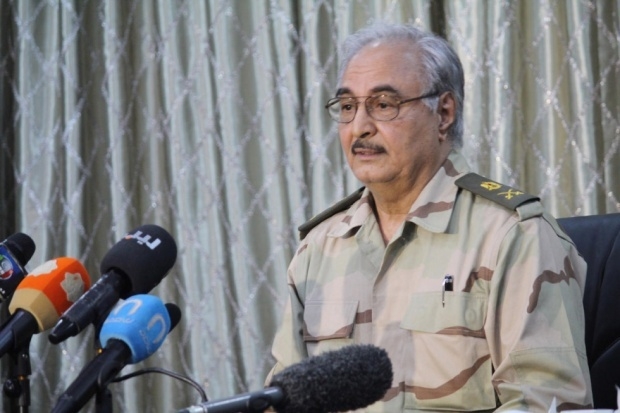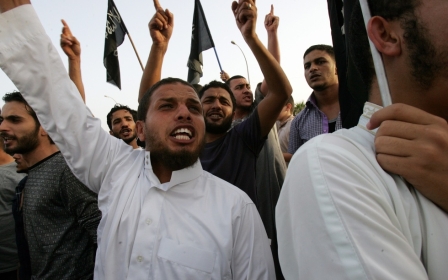Libya's Haftar fails to gain ground in Benghazi offensive

Islamist fighters held their ground Thursday in the face of an assault by an ex-general backed by army units aimed at retaking Libya's second city of Benghazi, military sources said.
Medics said at least 17 people were killed in 24 hours of fighting since Khalifa Haftar's forces early on Wednesday launched what he called an operation to "liberate" the city.
Tanks spearheaded attacks on the Islamist "February 17 Martyrs Brigade," while warplanes carried out raids on its headquarters in a western suburb of the Mediterranean city.
Haftar's forces said they captured the February 17 headquarters after several hours of clashes on Wednesday.
But military sources said Thursday that pro-government forces were later forced to withdraw from the former army base under fire by Islamist fighters.
Several explosions and gunfire echoed throughout the night, AFP correspondents said, before the fighting eased on Thursday as military aircraft swept over the city.
Islamist fighters have seized control of large parts of turmoil-gripped Libya since a 2011 uprising against long-time leader Muammar Gaddafi.
The army has this time publicly thrown its weight behind Haftar, who launched a first, unsuccessful, campaign against the Islamists in May, dubbing it "Operation Dignity".
Before their rapprochement with Haftar, the authorities had in May accused the former Gaddafi-era general - who spent years in exile before returning to join the 2011 revolution - of trying to mount a coup.
Since launching Operation Dignity, Haftar and his forces have been steadily beaten back to a final redoubt at Benghazi's airport.
Last week, more than 50 people were killed in fighting between the rival sides, according to military and hospital sources.
Haftar attacks western Libyan town of Kikla
Meanwhile, four people were killed and eight others injured on Wednesday when forces loyal to Haftar launched attacks against the western Libyan town of Kikla, a member of the Libyan House of Representatives said.
"The town was attacked with rockets by troops loyal Haftar," lawmaker Akram Shanioh, who had decided to boycott parliament sessions, told Anadolu Agency.
He added that Haftar's troops continued to attack the town, which forced its residents to flee. Shanioh said Kikla has been the site of clashes between Haftar's troops and Islamists for four days now.
On Wednesday, the Associated Press quoted two unnamed Egyptian officials as saying that Egyptian planes had struck sites belonging to Islamist in eastern Libya.
The two officials said that the strikes were "part of an Egypt-led operation against armed militias in Libya that also included Libyan ground forces."
However, the speaker of Libya's House of Representatives Aguila Salah has denied reports that Egypt was carrying out airstrikes against Islamist militias in the eastern city of Benghazi.
The Egyptian presidency also denied that its warplanes had struck Islamist militia sites in the flashpoint city.
The sharp political divisions in Libya have yielded two rival seats of government, each of which has its own institutions.
Two assemblies currently vie for legislative authority: a recently-elected House of Representatives, which convenes in the eastern city of Tobruk; and the General National Congress, which – even though its mandate ended in August – continues to convene in capital Tripoli.
The two parliaments support two different governments respectively headquartered in the two cities.
UN chief Ban Ki-moon made a surprise visit to Tripoli on Saturday to urge the warring factions to end the turmoil.
Stay informed with MEE's newsletters
Sign up to get the latest alerts, insights and analysis, starting with Turkey Unpacked
Middle East Eye delivers independent and unrivalled coverage and analysis of the Middle East, North Africa and beyond. To learn more about republishing this content and the associated fees, please fill out this form. More about MEE can be found here.




